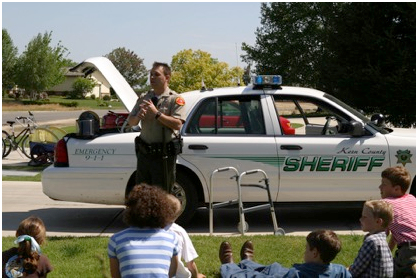
“A Piece of My Mind”
September 2019 Newsletter
Advancing Christian Faith and Values,
Defending Religious Liberty for All,
Supporting Civility and the Common Good
through Preaching, Teaching, Writing, Activism and Reasoned Conversations


El Paso & Dayton
“Do not trust in these deceptive words: ‘This is the temple of the Lord, the temple of the Lord.’”

“For if you truly amend your ways and your deeds, if you truly execute justice one with another, if you do not oppress the sojourner, the fatherless, or the widow, or shed innocent blood in this place, and if you do not go after other gods to your own harm, then I will let you dwell in this place, in the land that I gave of old to your fathers forever.” – Jeremiah 7:4-7 ESV
A strong and good heritage is important but not enough. Jeremiah the Prophet declared that changed hearts that serve God and people are a must if God’s blessing on the land is to continue. The application for America is clear.
My Opening Prayer at Church on August 11
Lord, today our hearts are grieving and we really need to hear the Book of Lamentations, because our own country has seen so much bloodshed in recent days. As Jeremiah lamented,
Joy is gone from our hearts;
our dancing has turned to mourning.
 We pray your very special comfort to those who have lost loved ones and who have been wounded. We pray for justice for those who do evil. We thank you for our first responders.
We pray your very special comfort to those who have lost loved ones and who have been wounded. We pray for justice for those who do evil. We thank you for our first responders.
We pray for our nation’s leaders as they face the question of what to do about violence. We pray they will put political ambition and posturing aside and search for real solutions. Guide them with your wisdom.
Forgive us all whenever we fail to love our neighbors as ourselves, including the foreigner in our midst.
Thank you for this beautiful day to worship you.
Fill us with your Holy Spirit so we might truly worship you.
Open our minds to hear the message [from the Book of Lamentations]. Bless our fellowship and prepare us to serve you. Make our words and lives be of special blessing to others in the week ahead.
We pray in the name of our Lord Jesus, before whom every knee shall bow. Amen.
Back the Badge – Psalm 106:3
“Blessed are those who maintain justice.”
Remembering Two Fallen Officers
 Deputy Sheriff Morris L. Taylor, 38
Deputy Sheriff Morris L. Taylor, 38
Douglas County Sheriff’s Office, Oregon
Killed by gunfire on September 14, 2002
Deputy Taylor was shot and killed after responding to a report involving a man performing lewd acts at a motel in Curtin, Oregon. I conducted his graveside service. His sister served on the board of Grace Community Church of Seal Beach.
 Deputy Sheriff Daniel Lee Archuleta, 35
Deputy Sheriff Daniel Lee Archuleta, 35
Kern County Sheriff’s Department, California
Killed in a traffic accident on September 12, 2004
Deputy Archuleta grew up in the church. He had been an Explorer with the Seal Beach Police Department. My wife and I travelled to Bakersfield for his funeral, where I was privileged to sing and offer a tribute. Later, a memorial was held at our church for the benefit of our own members and locals, and for some deputies of the L.A. County Sheriff’s Department, where he once served.
It was a very deep honor for me to be involved in the services for both of these fallen officers, who died doing what they were called to do.
 Message of the Month –
Message of the Month –
Government Fiscal Responsibility
“The borrower is servant to the lender.” – Proverbs 22:7
“When you run in debt; you give to another power over your liberty.”
– Benjamin Franklin
“We must not let our rulers load us with perpetual debt.” – Thomas Jefferson
Being financially responsible is a clear biblical mandate. We know we have to run our personal and family budgets this way or there will be natural consequences. Do our elected officials realize this same diligence is needed in local, state and federal governments? Any more we’re not so sure.
Local governments aren’t able to provide basic services while they fund a plethora of niceties and sometimes great excesses. State governments (like California) have steep graduated income tax rates that create plush surpluses in good times but dire shortages in lean times. Still, state governments create ongoing obligations that must be funded during lean times. With both state and local governments, the sure source for funds is more taxes.
And the federal government? We’re talking $23 trillion dollars of national debt, and growing. For the first time except during World War II the national debt exceeds the nation’s gross domestic product (GDP). And now there’s talk of cutting payroll taxes—needed to sustain Social Security and Medicare.
President Clinton was the last president to preside over a string of budget surpluses. In fact, when Federal Reserve Chairman Alan Greenspan testified before the Senate’s Committee on the Budget on January 25, 2001, he gave this optimistic prophecy:
The most recent projections from the OMB indicate that, if current policies remain in place, the total unified surplus will reach $800 billion in fiscal year 2011, including an on-budget surplus of $500 billion. The CBO reportedly will be showing even larger surpluses…
The most recent projections, granted their tentativeness, nonetheless make clear that the highly desirable goal of paying off the federal debt is in reach before the end of the decade.
From our vantage point in 2019, Greenspan’s words in 2001 seem so “long, long ago, far, far away.” Somewhere else in the galaxy.
Since then, under presidents Bush and Obama, it’s been deeper and deeper red ink and now Washington seems utterly unconcerned. The NY Times [July 22] says this about the careless two-year budget bill now signed into law:
But it is another sign that a Capitol once consumed by fiscal worries simply no longer cares — even as the government’s deficit approaches $1 trillion a year. Still, the accord would lift the debt ceiling high enough to allow the government to keep borrowing for two more years, punting the next showdown past the 2020 elections.
A string of presidential candidates would spend and create entitlements that will ensure massive deficits and a zooming national debt on into the ages.
Will there be a day of reckoning? Is it wise that China is the largest foreign creditor of our national debt at $1.11 trillion? Does this create leverage? Well yes, at the least it enables China to sell goods to the U.S. more cheaply.
Will enough willpower arise in Congress and in the Administration to set in motion a process to tame or even turn around the deficit spending? Is this a moral crisis as well as a fiscal one?
My denomination approved this resolution at its annual meeting in July:
Governmental Responsibility
Governments must operate with a strong sense of integrity and faithfulness to the laws of the nation. They must honor their commitments to their citizens by fulfilling their basic duties, controlling entitlements and spending, and avoiding immense deficits that will burden future generations.
We warn our government against yielding to the passion for an ever-broader expansion of rights that are popular at the moment but are not wise or good for the long-range health of the nation.
World War 2 + 75
The war hit home in September 1944 when my uncle, John K. Shoemaker, age 25, was killed in France. The 100th anniversary of his birth is September 1, 2019. I never met him—I was born after his death.

Gravestone at Workman Cemetery, Danville Ohio
 Crossing the Meurthe River in France – September, 1944
Crossing the Meurthe River in France – September, 1944
One historical source gives a day-by-day account of this event. Here is September 22—the day of my uncle’s death:
“The showdown was set for 0530, 22 September and was kicked off by a 15-minute artillery barrage. K and L/Companies moved out to take the St. Clement-Moncel highway. K/Co reached the objective, but L/Co got pinned down on the west bank by machine gunners firing from the farm area stronghold. Finally, two tanks managed to wade through the marshy area to L/Company’s position. With the tanks leading the assault, they ran 27 enemy out of the barns. Another stalemate ensued as German anti-tank fire halted the infantry advance. I/Co regrouped to attack past the highway to the railroad tracks. The Company destroyed five enemy machine gun nests, clearing the highway. F/Co was sent to cover I/Company’s rear after reports of enemy tank sightings. The Regiment had achieved its objective, and the engineers were sent in to build a bridge overnight.
 “At 0430, 23 September, the bridge was completed. Anti-tank units were the first to cross and the day was spent moving the troops around to further secure the area…
“At 0430, 23 September, the bridge was completed. Anti-tank units were the first to cross and the day was spent moving the troops around to further secure the area…
“Once the dust had settled, the 79th Division, 314th Regiment had lost the equivalent in casualties to one-quarter of a battalion – most occurring in the 3rd battalion’s ranks. The 3rd battalion received a Presidential Unit Citation for its part in the Meurthe River battle.”
The 79th Infantry Division entered Germany in March 1945.
During its 13 months in Europe, 2476 of the 79th were killed in action.
First Amendment Vigilance
Religious Liberty – The “Grain” and the “Husks”
 “Congress shall make no law respecting an establishment of religion, or prohibiting the free exercise thereof, or abridging the freedom of speech, or of the press; or the right of the people peaceably to assemble, and to petition the Government for a redress of grievances.”
“Congress shall make no law respecting an establishment of religion, or prohibiting the free exercise thereof, or abridging the freedom of speech, or of the press; or the right of the people peaceably to assemble, and to petition the Government for a redress of grievances.”
Remembering the price paid for our freedom has been intense this year—
the 75th anniversary of the D-Day invasion in World War 2. But what if people don’t care or don’t even know their freedoms?”
A 2017 survey conducted by the University of Pennsylvania’s Annenberg Public Policy Center is alarming. Most Americans are ignorant of the rights provided by the First Amendment (in “The Bill of Rights”).
• 37% could not name a single right protected by the First Amendment.
• While 48% knew the First Amendment protected freedom of speech, the other rights it guarantees are far less known.
• Only 15% remembered the right to freedom of religion.
What is forgotten or never learned will not be cherished and defended when the challenges come, as they surely will.
Bible Insight – “The Devil? Whence Cometh He?”
To my non-Christian readers: you may question the whole notion of a spiritual being known as “Satan.” Perhaps you accept the physical realm, capable of scientific analysis, as the only true reality. But that may require faith, just as accepting the reality of the Devil and a spirit realm is an act of faith (I have no litmus paper to prove evil spirits are present). Most people, Christian or not, believe in a spiritual realm beyond the physical. Christians believe in a Supreme Being who dwells above time and space, and in the realities of angels and demonic spirits. It is a non-science issue, not an anti-science one.
To my non-Christian readers: you may question the whole notion of a spiritual being known as “Satan.” Perhaps you accept the physical realm, capable of scientific analysis, as the only true reality. But that may require faith, just as accepting the reality of the Devil and a spirit realm is an act of faith (I have no litmus paper to prove evil spirits are present). Most people, Christian or not, believe in a spiritual realm beyond the physical. Christians believe in a Supreme Being who dwells above time and space, and in the realities of angels and demonic spirits. It is a non-science issue, not an anti-science one.
Verses in the Bible always have their contexts. Many of us pull verses from their context and use them, sometimes acceptably, sometimes not. To knowingly use a verse contrary to its context is very wrong—not “spiritual” at all. A text without its context is a pretext to make it say what we wish it to say.
All that to say: some notions people have about the Devil (“Satan”) come from scriptures taken out of context.
What and where was Satan before he became, well, “Satan”?
“How you are fallen from heaven,
O Day Star [“Lucifer” * ], son of Dawn!
How you are cut down to the ground,
you who laid the nations low!
You said in your heart,
‘I will ascend to heaven;
above the stars of God
I will set my throne on high;
I will sit on the mount of assembly
in the far reaches of the north;
I will ascend above the heights of the clouds;
I will make myself like the Most High.’”
(Isaiah 14:12-14 English Standard Version)
The argument goes something like this: the description here, taken literally, cannot refer to any human ruler. So it must refer to the ruler of the realm of evil—the Devil himself. Thus, these verses are describing the pre-historic fall of the Devil from his place of angelic honor, due to his prideful ambition.
Nice theory, but no cigar. Because the text has a context. And the context is a taunt against an earthly king, the King of Babylon. Now a “taunt” is an expression of scorn or ridicule or derision. And that’s exactly what these verses are. The powerful, prideful King of Babylon will be brought down to nothing. Don’t take a taunt too literally—it may be full of hyperbole and characterizations that are not to be understood with wooden literalism.
Well then, what about Ezekiel 28?
“You were the signet of perfection,
full of wisdom and perfect in beauty.
You were in Eden, the garden of God. [12b-13a]
You were an anointed guardian cherub.
I placed you; you were on the holy mountain of God;
in the midst of the stones of fire you walked.
You were blameless in your ways
from the day you were created,
till unrighteousness was found in you.” [14-15]
Similar claim with these very selective proof texts: no mere earthly ruler was “perfect in beauty” or “in Eden” or a “cherub” on the “holy mountain of God.” So they must refer to the Evil One behind an evil ruler.
Similar problem: the context makes it clear that the King of Tyre (an ancient city adjacent to Israel on the eastern shore of the Mediterranean Sea) is the object of these words, which are a “lament”—a statement of pity over this
king’s sad fall from greatness to calamity. Again, don’t be too literal on details.
We know less about the original state of the Devil than we may have thought. Jude 6 (also 2 Peter 2:4) does speak of “the angels who did not stay within their own position of authority, but left their proper dwelling,” but it is not clear that this refers to Satan. We cautiously refer to Satan as a fallen angel.
Satan first appears on the scene in the Book of Job—as a sinister being who challenges God and afflicts Job terribly (Job 1:6-12; 2:1-10).
More important than where the Devil came from is where he is going. And what he is doing now.
The Devil “prowls around like a roaring lion” (1 Peter 5:8), strives to frustrate the work of God, tempts Christians away from God’s will, afflicts people, spreads false doctrines, tries to bring down spiritual leaders, and much more.
For still our ancient foe doth seek to work us woe;
His craft and power are great, and, armed with cruel hate,
On earth is not his equal.
– “A Mighty Fortress Is Our God” by Martin Luther
Don’t evade responsibility by blaming the Devil for everything! Evil in the world around us and our own sinful inclinations can tempt us to do lots of bad things (James 1:14-15).
The Devil’s doom is clear from Scripture—he will be cast into eternal fire “prepared for the devil and his angels” (Matthew 25:41; see Revelation 20:10).
Good riddance!
* “Lucifer” is a Latin name for the planet Venus, the “morning star.”
 Don’s Recent Ministry
Don’s Recent Ministry
Don’s message of July 28: “Jeremiah—Right Man for the Right Hour” (Jeremiah 1-20) can be heard at
www.gracesealbeach.org under “Resources”.
Website: www.donaldshoemakerministries.com
Contact me at: donaldshoemakerministries@verizon.net
“The commandment to love the stranger
is the most frequently repeated commandment in the Torah.”
—Dennis Prager, The Rational Bible: Genesis
[“Torah” = the Books of Moses, the first five books of the Bible]

Appendix – A Resolution Responding to the Current Immigration Crisis
[Note: Since 1985 I have chaired the Social Concerns Committee in my denomination, the Fellowship of Grace Brethren Churches (now using the name “Charis Fellowship”). The committee’s primary task is to prepare resolutions for delegates to consider at the denomination’s annual business session. I concluded this ministry at the end of this year’s session in July. In upcoming newsletters I will be presenting some of the resolutions for you to read. I hope you find them of value.]
Immigration Reform
America has been a land of immigrants since before the nation was founded. Between the extremes of nativism and open borders, most citizens have open arms toward immigrants but also see the rule of law and secure borders as essential for a safe and civil society. Today our nation and our churches are increasingly populated by people from a multitude of cultures and lands, and many of these people are undocumented.
How can our Charis Fellowship respond?
1. We call on our churches to give prayer, thought, discussion, and action toward addressing the problem of the undocumented immigrant in a God-honoring way.
2. We recognize the divisive and controversial nature of this debate, and we encourage dialogue in the churches that is respectful, open-minded, and solution focused.
3. We further call on our churches to be the “reconciling presence of Christ” in the midst of a broken system that creates rancor, resentment, racism, selfishness, fear, exploitation, danger, and disregard for the law.
4. We call on our society and elected leaders to rise above political posturing and rancor to work toward a solution on immigration that is compassionate and realistic—a solution that accomplishes the government’s responsibility to protect its citizens and guests, while at the same time provides relief to the oppressed.
5. We recognize that meaningful solutions to this problem are not easily reached and must come through a determined will to achieve them. We deplore the present situation when our Federal Government is unable to resolve key immigration issues year after year.
6. We also recognize that the United States cannot accommodate everyone who desires to come to this country. Correcting the situations that force many to flee their home countries is one way to reduce the number attempting to gain entry into the United States.
7. We also call on the Federal Government to be wise in its use of Foreign Aid to aid in reforming situations in those foreign countries.

